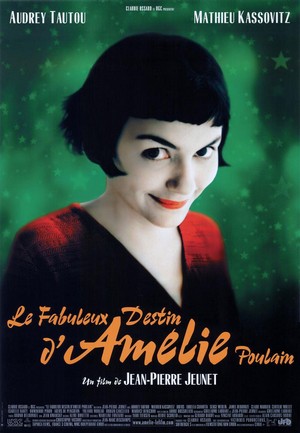
Le Fabuleux Destin d'Amélie Poulain (2001)
Amélie

Raiting: ![]() 8,3 /10
8,3 /10
Genre: Comedy
Director: Jean-Pierre Jeunet
Stars: Audrey Tautou, Mathieu Kassovitz and Dominique Pinon
Country: France / Germany
Release date: 25 April 2001
Length: 122 minutes


Raiting: ![]() 8,3 /10
8,3 /10
Genre: Comedy
Director: Jean-Pierre Jeunet
Stars: Audrey Tautou, Mathieu Kassovitz and Dominique Pinon
Country: France / Germany
Release date: 25 April 2001
Length: 122 minutes